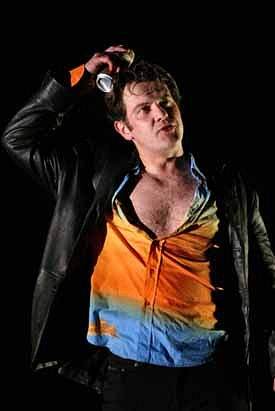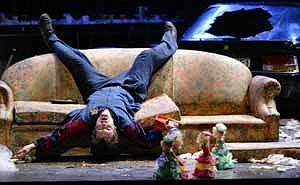|
Editor: Marc Bridle
Webmaster: Len Mullenger
|
Seen and Heard Opera Review
Wolfgang Amadeus Mozart, Don Giovanni. Soloists, Chorus and Orchestra of English National Opera/David Parry. Coliseum, London, Thursday, September 30th, 2004 (CC)
A welcome opportunity for London audiences to reappraise Calixto Bieito’s controversial staging of Mozart’s Don Giovanni here, and for this reviewer an opportunity to see it for the first time (Marc Bridle reviewed the first performance in 2001). The production caused a fair furore when it opened in 2001, and listing its more shocking moments it is perhaps easy to see why - fellatio, groping, a baseball-wielding Commendatore, knees in the bollocks (that made me wince), gratuitous violence, sex in front of a stiff, pissed-up threesomes and car back-seat intercourse are all present and correct. But then again, Giovanni is not supposed to be an easy ride given the issues it raises of morality and, indeed, misogyny.
This is a world of drugs and drink … and their consequences, the mind-alterations themselves an escapism, the result of a sick society. That the Commendatore at the close of the opera is not a statue, rather a bottle containing luminous pink liquid that (to the on-stage protagonists) becomes something else in those peoples’ minds as a possible result of withdrawal seems therefore a logical extension of Bieito’s premise of presenting the action of a debauched and fundamentally amoral world. The Commendatore’s body is found in the boot of a car, yet this Giovanni does not care because he is flying so high (Leporello, though, hides underneath a cushion.) This is life full-on and more. Colours are a riot in the party scenes, psychedelically, almost hallucinogenically so, costumes revealing a commedia dell’arte for the 21st century (including Spiderman; bunny and cat girls I can believe.) No one is innocent, not even Masetto (a wannabe Giovanni) or Zerlina (who is delighted when Giovanni pulls a gun, that archetypal phallic symbol of male strength, for the first time.) It’s just that Giovanni is the same as everyone else, but a little more extreme.
OK, a lot more. Instead of being dragged into Hell, Giovanni is present on-stage with back to audience in the very final scene, and everybody that feels so inclined gets a go at stabbing him. Amanda Holden’s superb translation reflects this pervasive depravity, being fully aware of contemporary-slang, anatomical and bodily-function nomenclature. It certainly aids directness (Leporello to Giovanni: ‘When it comes to women, you’re a two-faced bastard’.)
All of which justified the violence of the opening of Mozart’s opera. ENO’s orchestra, that most chameleon-like of London orchestras, gave a cracking account of the overture, setting the stage for their continued excellence. Parry’s ear for textural clarity and balance is spot-on (indeed, there was not a single instance of singers being drowned by orchestra all evening.) A car (registration CO-TORE 1) rolled forward, and enter Leporello, Iain Paterson. An archetype of English football loutishness (complete with scarf), Paterson superbly portrayed a sometimes ignorant, often lustful, awkward, overweight personage. ‘Notte e giorno’ was confidently despatched. But it was in the Catalogue aria that everything gelled (except ‘thousand and three’ doesn’t quite fit to the original ‘mille e tre’.) Parry was spot-on in the faster section; and evoked marvellous tonal areas in the slower.
The rogering of Donna Anna was amusingly depicted (perhaps predictably) by the movement of the stationary car (suspension is a great suggestive force.) Giovanni himself was ENO’s new Company Principal Mark Stone, looking (from a distance, at least) rather like Hugh Grant. Plausible success rate, then, I guess. Importantly, he was young and virile, and therefore believable. Vocally he had power but also youth, making his Act I Champagne aria (‘Fin ch’han dal vino’) a highlight. His final act depiction of the effects of sewer-like living, complete with an attack of the Coco-Pop munchies, was memorable. Linda Richardson, singing her first Donna Anna (and who took the role of Zerlina in the 2001 run of this production) was impassioned in her ‘Fuggi crudele’ (although she was to tend towards shrillness later in the evening.) In fact, casting for females was consistently excellent. Victoria Simmonds was the superb Zerlina on this occasion, pretty and pretty universally available. Former ENO Company Principal Mary Plazas’ Donna Elvira began a little under-powered and tremulous in longer lines in ‘Ah! Chi mi dice mai’ (perhaps surprisingly given this artist’s wealth of experience.) Yet Plazas was superb in the faster passages and exuded energy all evening, with a real dramatic presence.
For the males, Don Ottavio (Barry Banks) was the weakest link, needing more depth to his sound. He was also the most ‘stage-y’ actor. Masetto (William Berger) was a little low on vocal strength; Hens-Peter Scheidegger’s Commendatore was vocally strong. Parry also played fortepiano for the recitatives (how lovely that instrument sounded, how well it carried.) This sensitivity was continually reflected in his handling of singers and orchestra in his conducting.
In response to jokes (Bieito’s or, indeed, Mozart’s) the audience were as stony as the absent stature of the Commendatore. Giovanni on Zerlina: ‘I think she’ll be coming with me’ (the voice gave the italics.) This was emphatically not a directional entreaty. Was I the only one to laugh? The composer’s humour in the quotes in the final Act seemed to count for little, too. Mozart firstly takes a snippet from Soler’s ‘Una cosa rara’, then from ‘Fra i due litiganti il trezo gode’ (Sarti), then finally from his own Figaro. Actually, I wonder that the latter is not a narrative device in which Mozart (as so far ‘absent’ narrator) deliberately makes his presence known to the audience – he is telling the story after all. Nobody seemed to get any of this (Leporello’s comment ‘I’ve heard this once too often’ in response to the Figaro quote is simply lovely theatre to my mind.)
Calixto Bieito’s Giovanni is a disturbing evening (rightly so) on many levels. When Bieito sets scenes encrusted in post-party detritus, there is that depressing, deflated feeling everyone at some point in their lives must have felt. Far from being removed from present experience, this Mozart was almost uncomfortably relevant. Walking up Charing Cross Road towards Centre Point immediately after the opera, and watching the behaviour of members of the public under the influence, there was a distinct sense of deja-vu, indeed of resonance. I felt that I had entered another world for three hours, and here it was, outside the Coliseum as well. There was little disjunction between theatre and ‘reality’.
Magnificently thought-provoking. If you didn’t catch this Giovanni before, you should not miss it this time round.
Colin Clarke
Photo Credits: Don Giovanni (Mark Stone) in Mozart's Don Giovanni - photographer Bill Rafferty
Back to the Top Back to the Index Page |
| ||
|
||||




